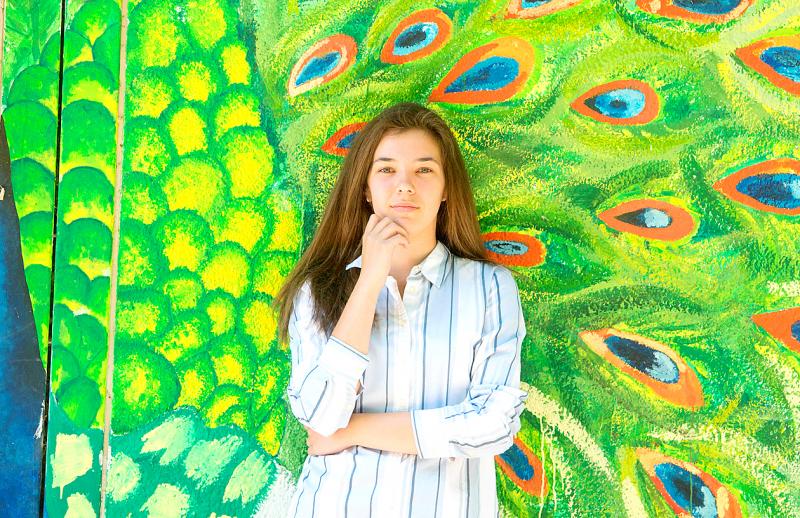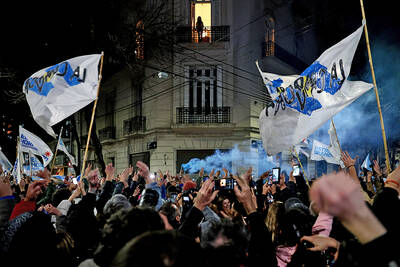With their art, technology know-how, creative social networking skills or political commitment, post-millennials, known as Generation Z, have found their own ways to help others through the COVID-19 pandemic.
From Colombia to Senegal, Malaysia to North Macedonia, Agence France-Presse talked to a group of 15-to-24-year-olds, who put their energy and skills to use within their communities, contributing perhaps to shaping the post-pandemic world.
Only history will tell if they will become the “Coronavirus Generation,” forever marked at a formative time in their lives by the pandemic, which brought more than half the planet to a standstill.

Photo: AFP
“If I don’t volunteer and those like me don’t volunteer, then who will?” asked Malak Sabah, 24.
In her high-visibility vest, she has been the linchpin of an initiative to sanitize the streets of Lebanon’s overcrowded Wavel Palestinian refugee camp, where she grew up.
Worried that some were not taking the risk seriously enough after the first COVID-19 case in the camp, an awareness campaign was launched, Sabah said.
“It’s a hidden virus, you can’t deal with it with physical strength, it requires awareness, knowledge and protection,” she said.
Having always known a world connected by the likes of Google, Facebook and Amazon, this generation understands the power of social networks in getting a message across, said Walid Badi, a French professional handball player.
Not only that, but these young people also realize they are best placed “to help the most vulnerable,” said the 24-year-old, who lives in Ivry-sur-Seine near Paris.
The pandemic demonstrated that “we’re not just good for staying at home, hooked to our smartphones, but are deeply rooted in reality,” he added.
While competitions were off the cards during confinement, he used the time to step up action through his Solidaritess association in aid of the homeless, distributing clothes to the “forgotten” in the suburbs of the French capital.
Jose Otero, a 22-year-old Venezuelan living in Colombia, has come up with what he describes as a low-cost drone to beat the travel restrictions by carrying medicine and test results around the northern city of Barranquilla.
“They used to tell us that we had to separate ourselves from technological devices or telephones because that separated us,” Otero said. “On the contrary, right now it is what unites us.”
In Senegal, engineering student Ibrahima Cisse, 23, and his friends at Dakar’s ESP Polytechnic Higher School built a special bicycle equipped with a hand sanitizer dispenser and a rear-end loudspeaker for sharing preventative information.
He said that they were learning how to be useful through initiatives that take into account the environment, people’s needs and reducing costs.
“We’re in a poor country and you shouldn’t think of extravagant projects,” Cisse said.
Art has helped some youngsters overcome the confines of lockdown and health conditions while living in small apartments.
Wan Jamila Wan Shaiful Bahri, a 17-year-old autistic painter from Malaysia, devoted her time to creating her “Our Heroes” series in tribute to front-line workers.
“I compile all the stories I saw in the daily news regarding coronavirus,” she said from her studio at her home just outside Kuala Lumpur.
Better known as Artjamila, the teenager proudly showed one of her canvasses, depicting people dressed in blue, with big, dark eyes looking worried above their masks.
One of her works was selected for a Malaysian Ministry of Health awareness campaign.
More than 10,000km away in North Macedonia, high-school student Eva Stojcevska found a way to keep her passion for drama alive, despite performances being canceled.
To save her school’s annual cultural festival, the 16-year-old from Skopje and her friends reorganized it on Facebook, where several dozen people took to the virtual stage for live shows.
With more than 40,000 views and rave reviews, it “turned out a lot better than expected,” Stojcevska said.
From Hong Kong to Santiago, and in other cities, too, the pandemic forced the temporary suspension of demonstrations for change by pro-democracy movements, but they are only on pause, said 24-year-old Camila from Chile.
Preferring not to divulge her surname, she said that she had taken part in protests against social inequality in her nation since the end of October last year.
“This government prefers to risk seeing you die than to see its companies suffer losses,” she said.
In the face of exploding unemployment in the poorest parts of the capital, Santiago, some residents have already defied the lockdown to demonstrate and call for food aid, and when the pandemic is over, many would take to the streets again because they have lost a loved one and the government did not look after them, Camila said.
As well as feelings of injustice and, at times, anger, the young people also expressed great optimism and hope that positive lessons would be learned from the unprecedented crisis.
“I hope that, in future, people will be more aware of their health, more aware of the environment around them and understand that even their smallest steps can influence everyone,” said Stojcevska, emphasizing the threat of climate change.
Badi is hoping that society would become more focused on equality and social cohesion.
“We realize that certain jobs, usually neglected, in the end are more important,” he said, referring to how there would have been nothing to eat without cashiers showing up for work during lockdown.
However, for many young people the pandemic has made their economic futures more uncertain.
The 15-to-24-year-olds are already the main victims of the economic slump, with one in six out of work, an International Labour Organization study has shown.
As the world faces historic economic and social costs from the pandemic, Sabah knows that hard times still lie ahead.
“But they won’t last forever,” she said.

LANDMARK CASE: ‘Every night we were dragged to US soldiers and sexually abused. Every week we were forced to undergo venereal disease tests,’ a victim said More than 100 South Korean women who were forced to work as prostitutes for US soldiers stationed in the country have filed a landmark lawsuit accusing Washington of abuse, their lawyers said yesterday. Historians and activists say tens of thousands of South Korean women worked for state-sanctioned brothels from the 1950s to 1980s, serving US troops stationed in country to protect the South from North Korea. In 2022, South Korea’s top court ruled that the government had illegally “established, managed and operated” such brothels for the US military, ordering it to pay about 120 plaintiffs compensation. Last week, 117 victims

China on Monday announced its first ever sanctions against an individual Japanese lawmaker, targeting China-born Hei Seki for “spreading fallacies” on issues such as Taiwan, Hong Kong and disputed islands, prompting a protest from Tokyo. Beijing has an ongoing spat with Tokyo over islands in the East China Sea claimed by both countries, and considers foreign criticism on sensitive political topics to be acts of interference. Seki, a naturalised Japanese citizen, “spread false information, colluded with Japanese anti-China forces, and wantonly attacked and smeared China”, foreign ministry spokesman Lin Jian told reporters on Monday. “For his own selfish interests, (Seki)

Argentine President Javier Milei on Sunday vowed to “accelerate” his libertarian reforms after a crushing defeat in Buenos Aires provincial elections. The 54-year-old economist has slashed public spending, dismissed tens of thousands of public employees and led a major deregulation drive since taking office in December 2023. He acknowledged his party’s “clear defeat” by the center-left Peronist movement in the elections to the legislature of Buenos Aires province, the country’s economic powerhouse. A deflated-sounding Milei admitted to unspecified “mistakes” which he vowed to “correct,” but said he would not be swayed “one millimeter” from his reform agenda. “We will deepen and accelerate it,” he

Japan yesterday heralded the coming-of-age of Japanese Prince Hisahito with an elaborate ceremony at the Imperial Palace, where a succession crisis is brewing. The nephew of Japanese Emperor Naruhito, Hisahito received a black silk-and-lacquer crown at the ceremony, which marks the beginning of his royal adult life. “Thank you very much for bestowing the crown today at the coming-of-age ceremony,” Hisahito said. “I will fulfill my duties, being aware of my responsibilities as an adult member of the imperial family.” Although the emperor has a daughter — Princess Aiko — the 23-year-old has been sidelined by the royal family’s male-only